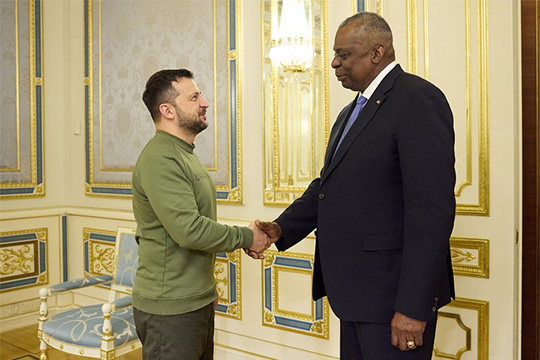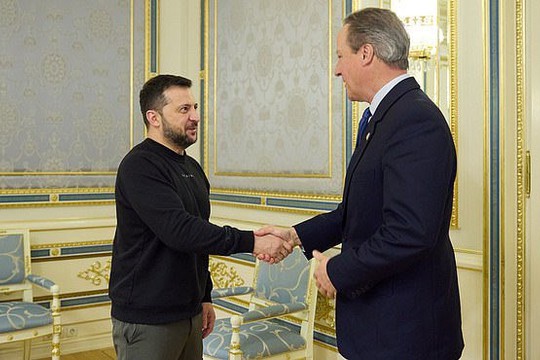President Zelensky and British Foreign Office chief David Cameron in Kyiv. Farewell visit?
America has become one of Ukraine’s greatest worries. Its aid for Ukraine is fast running out, and dysfunction in Congress is blocking new assistance. Nobody is sure when — or whether — it will be restored, writes ‘The Economist’.
The effect is being felt at the front as America tries to stretch its dwindling funds. “In the spring the flow of military supplies was a broad river. In the summer it was a stream. Now it is a few drops of tears,” says one informed Ukrainian source. Ukraine faces a bleak winter amid great uncertainty: its counter-offensive has failed to break through Russian lines; its enemy is increasing its arms production; and its vital ally is paralysed by political turmoil and distracted by Israel’s war in Gaza.
Lloyd Austin, America’s defence secretary, visited Kyiv on November 20th (photo) to reassure Ukraine that the United States will support Ukraine “both now and into the future”.

Yet Mr Austin knows that the power of the purse belongs to Congress; and the balance of power in Congress is held by an isolationist wing of the Republican party, especially in the House of Representatives, where one of their sympathisers now serves as the speaker. Twice since September Congress has passed a “continuing resolution” to avoid a shutdown of the federal government; and twice it excluded new aid for Ukraine.
The longer the delay, the more parties become consumed by election fever. If there is no deal before Christmas, some in Congress worry, a fresh allocation of aid may be delayed until after the elections in November 2024; and if Donald Trump is elected president it may be ended entirely. “Time is not our friend,” says one gloomy pro-Ukraine senator.
America has provided about $75bn in overall aid to Ukraine, and European countries collectively have delivered more than $100bn, according to American calculations. But crucially America still provides the larger share of military aid, with its contribution worth some $44bn. The Pentagon says it has about $5bn left in “presidential drawdown authority” (PDA) to supply Ukraine with weapons from its own arsenal, and just over $1bn in funds to replenish it. Given the depletion of military stocks across the West — and the crisis in the Middle East and a potential one over Taiwan — America’s brass may be reluctant to give away more than they are allowed to buy back.
PDA packages for Ukraine have shrunk, from an average of more than $1bn a month (and a peak of more than $5bn in January) to $350m in October and only $250m so far this month.
Josep Borrell, the European Union’s foreign-policy chief, has called on European countries to take up the slack from America if necessary. Indeed, they have issued a flurry of new promises recently. Germany said it planned to double its support for Ukraine next year to $8.5bn, and would also deliver more air-defence systems. The Netherlands, Finland and Lithuania all announced new packages of military help. But clouds loom. A constitutional-court ruling in Germany looks likely to hamper plans to boost aid. The hard right Freedom Party of Geert Wilders, which won the largest number of seats in the recent Dutch election, opposes sending weapons, raising questions about whether the Netherlands can still lead the coalition to supply f-16 jets to Ukraine. Slovakia’s new government has already halted military aid. Ukrainians worry that without American leadership, Europeans may quickly lose heart.
read more in our Telegram-channel https://t.me/The_International_Affairs

 11:46 29.11.2023 •
11:46 29.11.2023 •























